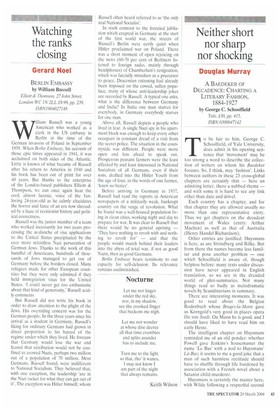Watching the ranks closing
Gerard Noel
BERLIN EMBASSY by William Russell Elliott & Thomson, 27 John Street, London WC 1N 2LL £9.99, pp. 239, 1SBN1904027148 William Russell was a young American who worked as a clerk in the US embassy in Berlin at the time of the German invasion of Poland in September 1939, When Berlin Embassy, his account of those epic times appeared in 1941, it was acclaimed on both sides of the Atlantic. Little is known of what became of Russell after his return to America in 1940 and his book has been out of print for over 40 years. But thanks to the enterprise of the London-based publishers Elliott & Thompson, we can once again hear the cool, almost laconic, voice of the funloving 24-year-old as he calmly elucidates the horror and farce of an era now shrouded by a haze of revisionist history and political correctness.
Russell was the junior member of a team who worked incessantly for two years processing the avalanche of visa applications to the United States precipitated by the ever more relentless Nazi persecution of German Jews, Thanks to the work of this handful of Americans, hundreds of thousands of Jews managed to get out of Germany before the borders closed. Many refugees made for other European countries but they were only admitted if they held immigration visas for the United States. 'I could never get too enthusiastic about that kind of generosity,' Russell acidly comments But Russell did not write his book in order to draw attention to the plight of the Jews. His overriding concern was for the German people. In the three years since his arrival as a student in Germany, Russell's liking for ordinary Germans had grown in direct proportion to his hatred of the regime under which they lived. He foresaw that Germany would lose the war and feared that retribution would not be confined to avowed Nazis. perhaps two million out of a population of 70 million. Most Germans. Russell found, were indifferent to National Socialism. They believed that, with one exception, the leadership 'are in the Nazi racket for what they can get out of it'. The exception was Hitler himself. whom Russell often heard referred to as 'the only real National Socialist'.
In stark contrast to the frenzied jubilation which erupted in Germany at the start of the first world war, the streets of Russell's Berlin were eerily quiet when Hitler proclaimed war on Poland. There was a short moment of open rejoicing on the news (60-70 per cent of Berliners listened to foreign radio, mainly through headphones) of Chamberlain's resignation, which was farcially mistaken as a precursor to peace. Draconian rationing had already been imposed on the cowed, sullen populace, many of whose anti-leadership jokes are recorded by Russell. A typical one asks, what is the difference between Germany and India? In India one man starves for everybody, in Germany everybody starves for one man.
Above all, Russell depicts a people who lived in fear. A single Nazi spy in his apartment block was enough to keep every other occupant in constant dread of a visit from the secret police. The situation in the countryside was different. People were more open and less afraid to speak out. Prosperous peasant farmers were the least affected by and least interested in National Socialism of all Germans, even if their sons, drafted into the Hitler Youth from the age of four, in the words of one farmer, 'knew no better'.
Before arriving in Germany in 1937, Russell had read the reports in American newspapers of a militarily weak, bankrupt country on the verge of revolution. What he found was a well-housed population living in clean cities, working night and day to prepare for war. It was clear to Russell that there would be no general uprising — 'They have nothing to revolt with and nothing to revolt for' — and that the people would march behind their leaders into the abyss of total war, if not as good Nazis, then as good Germans.
Berlin Embassy bears testimony to our capacity for self-delusion. Its relevance remains undiminished.
Nocturne
Let me not linger under the red sky, nor, in my shadow, see the crooked finger that beckons me nigh.
Let me not wonder at whose dire decree all that time crumbles and splits asunder has to include me.
Turn me to the light so that, tho' it wanes, I may not know I am part of the night that always remains.
Keith Wilson


















































































 Previous page
Previous page